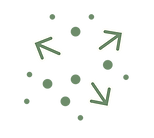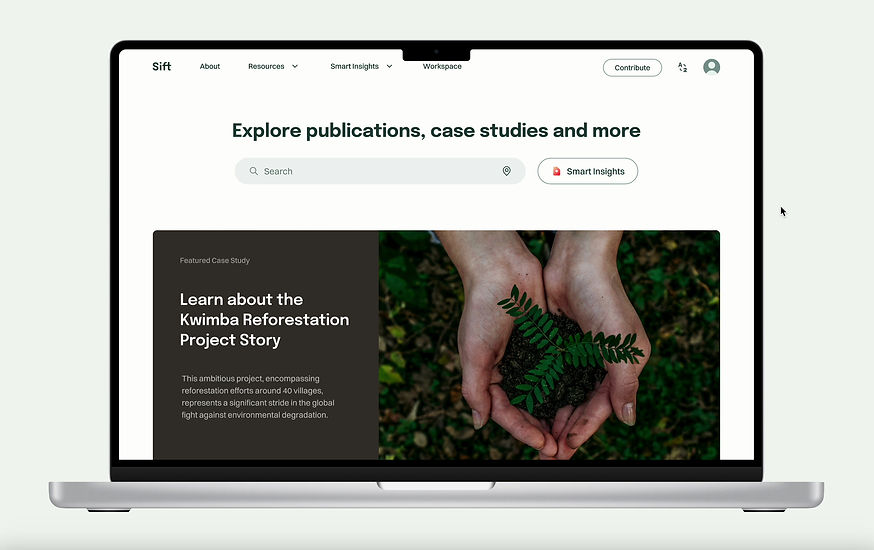top of page

An AI-powered open-source repository that streamlines project planning for forest restoration practitioners by collating essential resources and tools.
Built for Collaborative Earth ↗︎


Collaborative Earth
As part of our capstone project, we partnered with Collaborative Earth, a non-profit organization dedicated to restoring biodiversity worldwide.
We worked with the Assisted Forest Regeneration Lab whose mission is to support global reforestation goals with a tool to gather and synthesize available reforestation knowledge (including unpublished data from field partners, and non-English sources).
My Role
UX Research
Design Systems
Usability Testing
Team
Anusha Thalnerkar
Kirtana Kannan
Priyam Shah
Rishma Bora
Duration
6 months
Nature of the Project
A project embodying the true collaborative spirit

Presenting

Research

Sync-Ups

Presenting
1/3
Collaborative Earth
We partnered with the Assisted Forest Regeneration Lab.
California College of the Arts
I worked with a diverse team bringing expertise in graphic design, research, and business acumen.
Forest Restoration Community
We conducted co-design workshops, & usability tests with 15+ practitioners.
Theory of Change Framework
This framework acted as a guiding anchor for our project, consistently keeping us aligned with the right vision.

Forest restoration practitioners face an overwhelming task of sifting through sparse information.
Problem Area.

We designed a repository which facilitates planning & collaboration, by leveraging
AI to collate resources.
Designed Solution.

By emphasizing accurate decision-making, we can facilitate inter-lab collaboration for improved restoration outcomes.
Envisioned Impact.
Solution Overview: Key Features

An open-source repository for
forest restoration knowledge.
1. Dynamic Search

Dual search functionality enabling forest restoration practitioners to search and get quick insights on documents they upload.
2. Seamless Integration of AI

Trained on a domain specific Large Language Model with thousands of vetted resources, Sift generates succinct AI summaries.
3. Workspace for Practitioners


Making collaboration easier by introducing workspaces for practitioners that are working in silos can feel more connected and upto date with knowledge.
User Journey of a Forest Restoration Practitioner
Professionals dedicated to restoring and rehabilitating degraded forest ecosystems to their natural, healthy state.

Chosen area of focus: Researching and Planning
Effective project planning leads to successful outcomes, which when reported, assist other practitioners in planning their own projects.
Diving Deep: Research to Insights
Through conversations with 15 restoration ecologist, org leaders and practitioners, we learned about their needs & challenges.

Theme 2
Variation in Tools
“I would note that use of a mapping program has been a bit of an obstacle maybe in certain projects.”
Organization Lead at Collaborative Earth

Theme 1
Sparse and scattered documentation
“Sometimes we end up with over 20,000 abstracts, and then have to sort through the relevant ones to get the necessary data.”
Restoration Ecologist at Collaborative Earth

Theme 3
Drivers of success: involvement of community and stakeholders
“For restoration to be successful, it should improve people’s livelihoods - primarily financial.”
Restoration Ecologist at Collaborative Earth
Our Process Principles
Our process was non-linear, & extremely iterative.

Building a Design System
Building a design system made the non-linear, iterative process much smoother. Creating color and typography tokens, and reusable components allowed me to make consistent updates across the product.


Detailed Solution

Onboarding the
Practitioners
When forest restoration practitioners share essential details about their work and specific projects, it enables Sift to create relevant and valuable content.

Searching for
resources
Given the unique nature of restoration efforts in each locality, Sift offers a robust filter panel to help practitioners access the most precise information.

Accurate Insights
Smart Insights using AI are generated taking into account three scenarios:
Summary of the search result, an individual resource and summary extracted from a document uploaded or based on prompt.
What didn't work:
A standalone ChatGPT-like UI was removed after understanding practitioners' mental models in usability tests- a seamless AI integration within the platform was needed to build trust.

Practitioner's
Workspace
The workspace enables collaboration with a Personal Archive for organizing resources and Collections for teams to share and communicate through notes.
What didn't work:
Initially, we aimed to help practitioners document their past projects on the tool. However, resource collection proved more viable due to the abundance of existing platforms for documentation.
With the niche domain
of the project, we faced
a few challenges.

Challenge 01
Interpreting data and structuring information to build a product from the ground up.
Especially when all we started with was an Excel sheet, which required us to make sense of the data and develop an entirely new tool.


Challenge 02
Growing use of AI points to the challenge of striking the balance between designing an intuitive yet unique product.
In order to build a tool that would help easily access and organize vetted knowledge, we had to think of functionality with a seamless integration of AI.

Measuring Impact
The tool is currently in development, with the dataset still being trained. Here are some of the anticipated impacts.
User Engagement
Total user base.
Rate of new users logging in.
Geographic Distribution.
Network Growth
& Collaboration
New collaboration pathways established.
Number of partnered labs.
Content Utilization
Number of resources saved.
Number of projects.

Learnings & Reflections
When in doubt,
test it out!
Every page and feature was finalized through community feedback and multiple iterations to achieve our desired outcome. Involving practitioners in each step of the process ensured ease of use and allowed for seamless integration in their workfllow.
Working
with AI
This project let me to explore AI's potential and constraints while gaining insight into people's perceptions of it. With this understanding, we designed a product where AI enhanced the experience in a meaningful manner, building user trust and ensuring impact.
Being able to pivot, and realign focus.
We often had to pivot from initial concepts, with our 'Theory of Change' framework serving as a guiding anchor. Embracing change helped us stay agile and make more informed decisions along the way.
bottom of page
